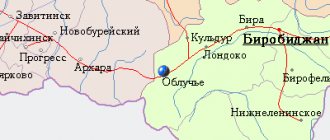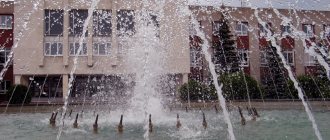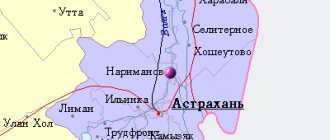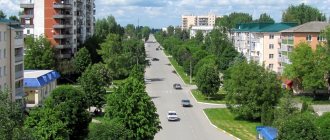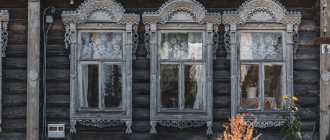Zelenokumsk
(Stavropol region)
OKATO code:
07250501
Founded:
1762
City since:
1965 City of regional subordination
Center:
Sovetsky district
City was formerly called:
| Vorontsovo-Alexandrovskoe | 1963 | |
| Soviet | 1963 | 1965 |
| Telephone code (reference phone) | |
| 86552***** | 21-1-68 |
Deviation from Moscow time, hours:
0
Geographic latitude:
44°25′
Geographic longitude:
43°53′
Altitude above sea level, meters:
145 Sunrise and sunset times of the Sun and Moon in the city of Zelenokumsk
Religion
Russian Orthodox Church
- In 1998, priest Gennady (Litomin), with the blessing of Metropolitan Gideon, began construction of an Orthodox church, which (like the first church in Zelenokumsk) was named in honor of Peter and Paul. The Orthodox Church of Peter and Paul, built in 1791, later became a chapel of the Kazan Cathedral, which was destroyed in 1938.
- Orthodox Church of the Kazan Icon of the Mother of God - st. Krupskaya, 107
- Chapel in honor of the holy passion-bearer Tsarevich Alexei at the children's hospital[63]
Protestantism
- The Seventh-day Adventist prayer house is located at 91 Zavodskaya Street.
- The prayer house of Evangelical Christian Baptists is located at the address: Zavodskaya Street, 162/a.
Map
| Zelenokumsk: maps |
Zelenokumsk: photo from space (Google Maps) Zelenokumsk: photo from space (Microsoft Virtual Earth)
| Zelenokumsk. Nearest cities. Distances in km. on the map (in brackets along roads) + direction. Using the hyperlink in the distance , you can get the route (information courtesy of the AutoTransInfo website) | |||
| 1 | Soldato-Alexandrovskoe | 19 (23) | SW |
| 2 | Newly established | 26 () | SW |
| 3 | Abundant | 32 () | SW |
| 4 | Chernolesskoye | 36 (92) | WITH |
| 5 | Krasnokumskoe | 40 () | SW |
| 6 | Podgornaya | 43 (46) | SW |
| 7 | Praskovey | 44 () | NE |
| 8 | Georgievsk | 44 (53) | SW |
| 9 | Soviet | 45 () | YU |
| 10 | Budennovsk | 45 (53) | NE |
| 11 | Georgievskaya | 46 () | SW |
| 12 | Alexandria | 48 (50) | SW |
| 13 | Kindly | 50 () | SW |
| 14 | Novoselitskoye | 51 (115) | NW |
| 15 | Deceased | 53 () | NE |
| 16 | Novopavlovsk | 53 (79) | YU |
| 17 | Stepnoe | 57 () | IN |
| 18 | Lysogorskaya | 60 () | SW |
| 19 | Levokumka | 61 (70) | Z |
| 20 | Kursk | 62 (70) | SE |
| 21 | Mineral water | 63 (72) | Z |
| 22 | Andzhievsky | 65 () | Z |
| 23 | Edission | 67 () | SE |
| 24 | Maryinskaya | 68 () | SW |
| 25 | Karagach (Kabardino-Balkarian Republic) | 69 () | YU |
| 26 | Konstantinovskaya | 71 () | SW |
| 27 | Cuba (Kabardino-Balkarian Republic) | 71 () | SW |
| 28 | Inozemtsevo | 72 (87) | SW |
| 29 | Zolskaya | 73 () | SW |
| 30 | Chill | 73 (120) | YU |
a brief description of
Located in the Ciscaucasia, on the Stavropol Upland, on the river. Kuma, 265 km east of Stavropol. Railway station.
Territory (sq. km): 508
Information about the city of Zelenokumsk on the Russian Wikipedia site
Historical sketch
It arose in 1762 as the village of Vorontsovo-Aleksandrovskoye on the lands of Count Alexander Vorontsov through the resettlement of peasants from the village of Vorontsovka and the settlement of Aleksandrovka, Voronezh province, named after the name and surname of the owner.
In 1963, the village was renamed Sovetskoye. The city of Zelenokumsk since October 9, 1965, was formed from the village of Sovetskoye (11.5 thousand inhabitants, 1959) and the village of Novogrigorievskoye (9.9 thousand inhabitants, 1939; 10.7 thousand inhabitants, 1959).
Name by location on the river. Kuma; The definition of green has a purely conditional meaning.
Economy
(low-voltage equipment), "Stroymash", auto repair, experimental mechanical. Weaving factory.
Food industry enterprises: factories - dairy and food products, etc.
In the Sovetsky region, wheat, corn, peas, sunflowers, vegetables, grapes, etc. are grown. Production of milk, wool, and meat. Pig farming.
Deposits of sand and gravel mixtures, loams.
Museums, galleries, exhibition halls
Zelenokumsk Museum of Local Lore 357900, Stavropol Territory, Zelenokumsk, sq. Lenina, 74 Phone(s): (86552) 21-246
Architecture, sights
In the village of Otkaznoe, 20 km west of Zelenokumsk, there is the Church of St. Nicholas the Pleasant (1902, brick; in operation since 1992).
| Population by year (thousands of inhabitants) | |||||||
| 1939 | 10.7 | 1996 | 38.8 | 2007 | 40.2 | 2015 | 35.6 |
| 1959 | 11.5 | 1998 | 39.5 | 2008 | 40.5 | 2016 | 35.6 |
| 1967 | 29 | 2000 | 40.0 | 2010 | 40.6 | 2017 | 35.6 |
| 1970 | 29.7 | 2001 | 39.8 | 2011 | 35.8 | 2018 | 35.5 |
| 1979 | 32.1 | 2003 | 40.3 | 2012 | 35.8 | 2019 | 34.7 |
| 1989 | 35.1 | 2005 | 40.3 | 2013 | 35.8 | 2020 | 34.1 |
| 1992 | 36.1 | 2006 | 40.1 | 2014 | 35.6 | 2021 | 33.7 |
Education
- Kindergarten No. 1 “Swallow”[33]
- Kindergarten No. 3 “Thumbelina”[34]
- Kindergarten No. 4 “Beryozka”[35]
- Kindergarten No. 5 “Snowflake”[36]
- Kindergarten No. 6 “Teremok”[37]
- Kindergarten No. 7 “Ogonyok”[38]
- Kindergarten No. 10 “First of May”[39]
- Kindergarten No. 14 “Ivushka”[40]
- Kindergarten No. 15 “Cheburashka”[41]
- Kindergarten No. 23 “Golden Key”[42]
- Kindergarten type No. 25 “Firefly”[43]
- Kindergarten No. 33 “Rodnichok”[44]
- Kindergarten No. 35 “Kolobok”[45]
- Kindergarten No. 39 “Skvorushka”[46]
- Kindergarten No. 40 “Topolek”[47]
- Secondary school No. 1[48]
- Secondary school No. 2[49]
- Secondary school No. 3[50]
- Secondary school No. 12[51]
- Secondary school No. 11[52][53]
- Secondary school No. 13[54]
- Secondary school No. 14[55]
- Evening (shift) secondary school No. 2[56]
- Multidisciplinary technical school[57]
- Children's music school[58]
- Children's art school[59]
- Children's and youth sports school[60]
- Children's and youth sports school for football[61]
- Center for Extracurricular Activities[62]
Monuments
Monuments of history and culture
- Monument to soldiers who died in battles with the Nazi invaders in January 1943 for the liberation of the village. Vorontsovo-Alexandrovsky. 1947[66]
- Fire of Eternal Glory to those who died during the Civil and Great Patriotic Wars. 1975[67]
- Monument to fallen defenders in local wars. 2003[68]
- Memorial to the soldiers of military unit 3673 who died in the Chechen wars (town No. 2 on the territory of military unit 6814)
- Memorial plaque for the evacuation hospital and graduates of secondary school No. 1 who fell in the battles of 1941-1945
- Monument to V.I. Lenin (central square)
- Monument to V.I. Lenin (near the Palace of Culture)
- Monument to V.I. Lenin (in the management of the Pension Fund
- Monument to V.I. Lenin (in the courtyard of JSC VELAN)
- Obelisk to Hero of the Soviet Union Y. S. Ardintsev
- Monument to Peter and Fevronia. 2012[69]
Monuments of urban planning and architecture
- Kashchenko's house. Now it houses a children's music school and a registry office[70]
- Shopping arcades. Now it is the Museum of Local Lore
Excerpt characterizing Zelenokumsk
“Bonjour, ma cousine,” said Pierre. – Vous ne me hesonnaissez pas? [Hello, cousin. You don’t recognize me?] – I recognize you too well, too well. – How is the count’s health? Can I see him? – Pierre asked awkwardly, as always, but not embarrassed. – The Count is suffering both physically and morally, and it seems that you took care to cause him more moral suffering. -Can I see the count? - Pierre repeated. - Hm!.. If you want to kill him, completely kill him, then you can see. Olga, go and see if the broth is ready for your uncle, it’s time soon,” she added, showing Pierre that they were busy and busy calming his father down, while he was obviously busy only upsetting him. Olga left. Pierre stood, looked at the sisters and, bowing, said: “Then I’ll go to my place.” When it is possible, you tell me. He went out, and the ringing but quiet laughter of the sister with the mole was heard behind him. The next day, Prince Vasily arrived and settled in the count's house. He called Pierre to him and said to him: “Mon cher, si vous vous conduisez ici, comme a Petersbourg, vous finirez tres mal; c'est tout ce que je vous dis. [My dear, if you behave here as in St. Petersburg, you will end very badly; I have nothing more to tell you.] The Count is very, very ill: you don’t need to see him at all. Since then, Pierre was not disturbed, and he spent the whole day alone upstairs in his room. While Boris entered his room, Pierre was walking around his room, occasionally stopping in the corners, making threatening gestures towards the wall, as if piercing an invisible enemy with a sword, and looking sternly over his glasses and then starting his walk again, uttering unclear words, shaking shoulders and arms outstretched. “L’Angleterre a vecu, [England is over,”] he said, frowning and pointing his finger at someone. - M. Pitt comme traitre a la nation et au droit des gens est condamiene a... [Pitt, as a traitor to the nation and people's law, is sentenced to...] - He did not have time to finish the sentence for Pitt, imagining himself at that moment as Napoleon himself and together with having already made the dangerous crossing of the Pas de Calais and conquered London as his hero, he saw a young, slender and handsome officer entering him. He stopped. Pierre left Boris as a fourteen-year-old boy and absolutely did not remember him; but, despite this, in his characteristic quick and cordial manner, he took him by the hand and smiled friendly. - Do you remember me? – Boris said calmly, with a pleasant smile. “I came with my mother to the count, but he seems to be not entirely healthy. - Yes, he seems unwell. “Everyone worries him,” Pierre answered, trying to remember who this young man was. Boris felt that Pierre did not recognize him, but did not consider it necessary to identify himself and, without experiencing the slightest embarrassment, looked him straight in the eyes. “Count Rostov asked you to come to dinner with him today,” he said after a rather long and awkward silence for Pierre. - A! Count Rostov! – Pierre spoke joyfully. - So you are his son, Ilya. As you can imagine, I didn’t recognize you at first. Remember how we went to Vorobyovy Gory cm me Jacquot... [Madame Jacquot...] a long time ago. “You’re mistaken,” Boris said slowly, with a bold and somewhat mocking smile. – I am Boris, the son of Princess Anna Mikhailovna Drubetskaya. Rostov's father is called Ilya, and his son is Nikolai. And I didn’t know any m me Jacquot. Pierre waved his arms and head as if mosquitoes or bees were attacking him. - Oh, what is this! I got everything mixed up. There are so many relatives in Moscow! Are you Boris...yes. Well, you and I have agreed. Well, what do you think about the Boulogne expedition? After all, the British will have a bad time if only Napoleon crosses the canal? I think the expedition is very possible. Villeneuve would not have made a mistake! Boris knew nothing about the Boulogne expedition, he did not read the newspapers and heard about Villeneuve for the first time. “We are more busy here in Moscow with dinners and gossip than with politics,” he said in his calm, mocking tone. – I don’t know anything about it and don’t think anything about it. Moscow is most busy with gossip,” he continued. “Now they’re talking about you and the count.” Pierre smiled his kind smile, as if afraid for his interlocutor, lest he might say something for which he would repent. But Boris spoke distinctly, clearly and dryly, looking directly into Pierre’s eyes. “Moscow has nothing better to do than gossip,” he continued. “Everyone is busy with who the count will leave his fortune to, although perhaps he will outlive us all, which is what I sincerely wish...” “Yes, this is all very difficult,” Pierre picked up, “very difficult.” “Pierre was still afraid that this officer would accidentally get into an awkward conversation for himself. “And it must seem to you,” Boris said, blushing slightly, but without changing his voice and posture, “it must seem to you that everyone is busy only with getting something from the rich man.” “So it is,” thought Pierre. “And I just want to tell you, in order to avoid misunderstandings, that you will be very mistaken if you count me and my mother among these people.” We are very poor, but I, at least, speak for myself: precisely because your father is rich, I do not consider myself his relative, and neither I nor my mother will ever ask or accept anything from him. Pierre could not understand for a long time, but when he understood, he jumped up from the sofa, grabbed Boris’s hand from below with his characteristic speed and awkwardness and, flushed much more than Boris, began to speak with a mixed feeling of shame and annoyance. - This is strange! I really... and who could have thought... I know very well... But Boris interrupted him again: “I’m glad I expressed everything.” Maybe it’s unpleasant for you, excuse me,” he said, reassuring Pierre, instead of being reassured by him, “but I hope I didn’t offend you.” I have a rule of saying everything directly... How can I convey it? Will you come to dinner with the Rostovs? And Boris, apparently having relieved himself of a heavy duty, getting out of an awkward situation himself and putting someone else in it, became completely pleasant again. “No, listen,” Pierre said, calming down. – You are an amazing person. What you just said is very good, very good. Of course you don't know me. We haven’t seen each other for so long... since we were children... You can assume in me... I understand you, I understand you very much. I wouldn't do it, I wouldn't have the guts, but it's wonderful. I am very glad that I met you. It’s strange,” he added, after a pause and smiling, “what you assumed in me!” - He laughed. - Well, so what? We'll get to know you better. Please. – He shook hands with Boris. – You know, I have never been to the count. He didn’t call me... I feel sorry for him as a person... But what to do? – And you think that Napoleon will have time to transport the army? – Boris asked, smiling. Pierre realized that Boris wanted to change the conversation, and, agreeing with him, began to outline the advantages and disadvantages of the Boulogne enterprise. The footman came to summon Boris to the princess. The princess was leaving. Pierre promised to come for dinner in order to get closer to Boris, firmly shook his hand, looking affectionately into his eyes through his glasses... After he left, Pierre walked around the room for a long time, no longer piercing the invisible enemy with his sword, but smiling at the memory of this dear, smart and strong young man. As happens in early youth and especially in a lonely situation, he felt an unreasonable tenderness for this young man and promised himself to make friends with him. Prince Vasily saw off the princess. The princess held a handkerchief to her eyes, and her face was in tears. - It's horrible! terrible! - she said, - but no matter what it costs me, I will do my duty. I'll come over for the night. He can't be left like that. Every minute is precious. I don’t understand why the princesses are delaying. Maybe God will help me find a way to prepare it!... Adieu, mon prince, que le bon Dieu vous soutienne... [Farewell, prince, may God support you.] - Adieu, ma bonne, [Farewell, my dear,] - answered the prince Vasily, turning away from her. “Oh, he’s in a terrible situation,” the mother said to her son as they got back into the carriage. “He hardly recognizes anyone.” “I don’t understand, mamma, what is his relationship with Pierre?” - asked the son. “The will will say everything, my friend; Our fate depends on him... - But why do you think that he will leave anything to us? - Ah, my friend! He is so rich and we are so poor! “Well, that’s not a good enough reason, mummy.” - Oh my god! My God! How bad he is! - exclaimed the mother. When Anna Mikhailovna left with her son to visit Count Kirill Vladimirovich Bezukhy, Countess Rostova sat alone for a long time, putting a handkerchief to her eyes. Finally, she called. “What are you talking about, dear,” she said angrily to the girl, who made herself wait for several minutes. – Don’t you want to serve, or what? So I'll find a place for you. The countess was upset by the grief and humiliating poverty of her friend and therefore was out of sorts, which she always expressed by calling the maid “dear” and “you.” “It’s your fault,” said the maid. - Ask the Count to come to me. The Count, waddled, approached his wife with a somewhat guilty look, as always. - Well, countess! What a saute au madere [sauté in Madeira] will be from hazel grouse, ma chere! I tried; It’s not for nothing that I gave a thousand rubles for Taraska. Costs! He sat down next to his wife, resting his arms bravely on his knees and ruffling his gray hair. - What do you order, Countess? - So, my friend, what is it that you have dirty here? - she said, pointing to the vest. “It’s sote, that’s right,” she added, smiling. - That's it, Count: I need money. Her face became sad. - Oh, countess!... And the count began to fuss, taking out his wallet. “I need a lot, Count, I need five hundred rubles.” And she, taking out a cambric handkerchief, rubbed her husband’s vest with it. - Now. Hey, who's there? - he shouted in a voice that only people shout when they are sure that those they are calling will rush headlong to their call. - Send Mitenka to me! Mitenka, that noble son raised by the count, who was now in charge of all his affairs, entered the room with quiet steps. “That’s it, my dear,” said the count to the respectful young man who entered. “Bring me…” he thought. - Yes, 700 rubles, yes. But look, don’t bring anything torn and dirty like that time, but good ones for the countess. “Yes, Mitenka, please, keep them clean,” said the countess, sighing sadly. - Your Excellency, when will you order it to be delivered? - said Mitenka. “If you please know that... However, please don’t worry,” he added, noticing how the count had already begun to breathe heavily and quickly, which was always a sign of beginning anger. - I forgot... Will you order it to be delivered this minute? - Yes, yes, then, bring it. Give it to the Countess. “This Mitenka is such gold,” the count added, smiling, when the young man left. - No, it’s not possible. I can't stand this. Everything is possible. - Oh, money, count, money, how much grief it causes in the world! - said the countess. - And I really need this money. “You, countess, are a well-known reel,” said the count and, kissing his wife’s hand, he went back into the office. When Anna Mikhailovna returned again from Bezukhoy, the countess already had money, all in brand new pieces of paper, under a scarf on the table, and Anna Mikhailovna noticed that the countess was disturbed by something. - Well, what, my friend? – asked the Countess. - Oh, what a terrible situation he is in! It is impossible to recognize him, he is so bad, so bad; I stayed for a minute and didn’t say two words... “Annette, for God’s sake, don’t refuse me,” the countess suddenly said, blushing, which was so strange in her middle-aged, thin and important face, taking money out from under her scarf. Anna Mikhailovna instantly understood what was happening, and already bent down to deftly hug the countess at the right moment. - Here's to Boris from me, to sew a uniform... Anna Mikhailovna was already hugging her and crying. The Countess cried too. They cried that they were friends; and that they are good; and that they, friends of youth, are busy with such a low subject - money; and that their youth had passed... But the tears of both were pleasant... Countess Rostova with her daughters and already with a large number of guests was sitting in the living room. The Count led the male guests into his office, offering them his hunting collection of Turkish pipes. Occasionally he would go out and ask: has she arrived? They were waiting for Marya Dmitrievna Akhrosimova, nicknamed in society le terrible dragon, [a terrible dragon,] a lady famous not for wealth, not for honors, but for her directness of mind and frank simplicity of manner. Marya Dmitrievna was known by the royal family, all of Moscow and all of St. Petersburg knew her, and both cities, surprised by her, secretly laughed at her rudeness and told jokes about her; nevertheless, everyone without exception respected and feared her.


